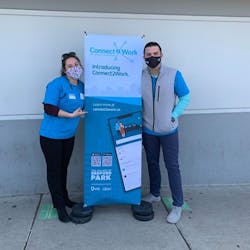How the Village of Bedford Park and Uber Connect People to Jobs
Industrial areas are major sources of employment across North American cities. Access to these employment centers is critical for propelling a thriving economy, but sprawling land uses, 24/7 shift changes and last mile gaps make it difficult to provide frequent, fixed-route transit service to these industrial areas. Executives and planners from cities, business parks and transit agencies are seeking ways to usher in more convenient options for these difficult-to-reach areas.
For employers, access to transportation and traffic congestion can be a significant barrier for hiring and retaining workers and can impact both employer and worker satisfaction.
The village of Bedford Park, an inner-ring suburb of Chicago, is taking this issue head on and has partnered with local transit agencies, businesses and mobility providers to test and deploy creative strategies for tackling these transportation and workforce challenges. As a result of these efforts, 400 businesses and more than 27,000 employees have access to easier public transit commute options.
Multi-stakeholder support plus a community-driven approach
The Connect2Work pilot program emerged through Bedford Park’s last-mile mobility planning efforts. In 2018, the village was awarded funding through Cook County’s “Invest in Cook” program to develop a last-mile mobility study and action plan. These guiding documents—and the stakeholder engagement efforts that informed them—identified the need for both pragmatic and innovative transportation solutions for challenges like traffic congestion, gaps in the sidewalk network and limited access to transit. Connect2Work is one of several multimodal solutions that Bedford Park is currently advancing and the preliminary findings are promising.
To make this happen, numerous planning initiatives had to take flight, including community engagement administered through mobility surveys and meetings with employers, employees, transit agencies and other community stakeholders. A Mobility Day was also held to gather community feedback on main concerns.
One of the biggest community concerns with the status quo was safety. The existing route to and from transit was not pedestrian friendly. Employees would have to trek through busy cross-streets half a mile to and from the transit stops to their workplace. Others cited concerns around limited transit availability after hours or during shift changes.
“Finding solutions that work in Bedford Park will help inform the county’s work in other industrial corridors,” said Jennifer “Sis” Killen, superintendent of the Cook County Department of Transportation and Highways. “We can implement this model in other communities with similar transportation challenges both locally and across the country. Providing more equitable access and better transportation options are both core objectives for the county and this important program is critical to that mission.”
Hearing this feedback, Bedford Park wanted to find a way to take advantage of the area’s existing transit infrastructure, generate demand for transit and close gaps where there was limited transit frequency or hours when transit was not running.
The project required coordination from multiple stakeholders, including Bedford Park, Cook County Department of Transportation and Highways, Regional Transportation Authority, Chicago Transit Authority, Metra and Pace. The one-year pilot, which started in December 2020, was intended to create an equitable and integrated transportation network. Collaboration was key.
Partnering with Uber
To do this, Bedford Park partnered with Uber to provide last-mile connections to transit and late-night service as part of its multi-modal Connect2Work program.
Eligible program participants are Bedford Park employees. Employees become eligible by enrolling in the Connect2Work program and were offered discounted Uber rides to transit locations from 6:00 a.m. to –9:00 p.m. on weekdays and late-night service from 9:00 p.m. to –6:00 a.m.
The Connect2Work program covers 50 percent of a ride, up to $7. For example, if the fare is $5, a rider would only pay $2.50. If the fare is $10, the rider only pays $5. If the fare is $21, the rider will pay $14. Bedford Park employees are eligible for two discounted rides per weekday.
In addition, Connect2Work also provided a free shuttle service during weekdays during peak times/rush hour and a Mobility-as-a-Service journey planning app through other technology providers.
At the launch of the program, Bedford Park partnered with the Uber Transit marketing team to raise awareness and educate Bedford Park employees on this new benefit. Marketing support included a launch email, re-engagement communication, performance marketing and educational materials that they shared through employer events. The village saw 10 percent increases in ridership after each marketing touchpoint. Overall, since the launch of the program, rider adoption has increased with riders taking first-mile connections into transit at least three times a week and weekend service has been added to help third shift workers.
“Connect2Work represents innovation that increases access to opportunity and for us is a chance to develop strategies we can help support across the region,” said Leanne Redden, executive director of the Regional Transportation Authority. “Now more than ever, it is essential that we collaborate with public and private partners to build momentum towards implementing effective, scalable and sustainable last mile mobility solutions.”
As of July, the program expanded to include weekend service on both the first/last mile and late-night rides programs. Adoption has increased week over week and this past August reached a program high in utilization.
More than 6,000 individual commute trips have been improved since the launch of Connect2Work last December. Approximately 400 employees from more than 100 different Bedford Park businesses have taken a free shuttle or discounted Uber ride thus far and the number of new riders signing up for the program has increased every week since launch. Taken together, preliminary findings suggest that there is a strong demand for last-mile transportation services that connect transit hubs, like the Midway CTA station, to places of employment.
“Every week, we learn more about workers’ travel behaviors, the effectiveness of different marketing and outreach strategies and the feasibility of different partnership and business models. We’re also learning more about how ride hailing, microtransit and other shared mobility services can be leveraged to extend the reach of Chicagoland’s transit network while providing an alternative to driving alone,” said Curtis Witek, senior project manager, Antero Group.
The next phase of this effort will include final reporting, identifying a sustainable business model and scaling Connect2Work accordingly.
"The Connect2Work program has been successful in addressing long-standing mobility issues for our local employers and helping their employees gain better access to transportation options in Bedford Park,” said Bedford Park Mayor David Brady. “We are excited to see how Connect2Work continues to evolve in the village."
--------------
Daisy Wall is head of market expansion for Uber Transit.
About the Author

Daisy Wall
Head of Market Expansion, Uber Transit
Daisy Wall is a "transit nerd" with a decade of experience working with transit agencies to positively transform communities through technology and social impacts. She is excited to see how Transit as an industry has embraced complementary on demand solutions to bridge gaps, expand business and community partnerships, and provide more spontaneous and inclusive mobility for all.
